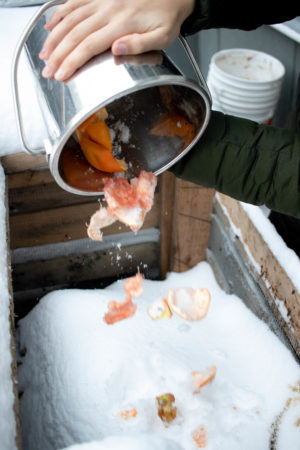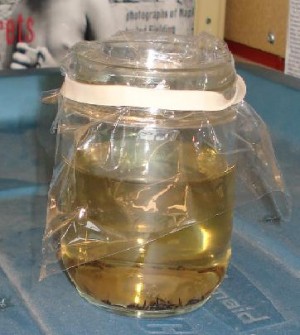Fruit flies: they’re harmless and tiny (and the only fly I can actually effectively kill with a swat) but they sure can be annoying. What can you do if your compost bucket seems to be generating them?
Rest easy – fruit flies are relatively easy to conquer! Here’s some easy solutions to your unwanted pests.
1.Take your compost out more frequently
Are you letting your compost build up indoors for a week or even more at a time? Fruit flies go from newly-laid egg to hatched in mere days, meaning most of the fruit you bring into your home is likely to produce fruit flies in just 2-3 days. Fresh fruits and vegetables aren’t appealing to fruit flies as locations to lay their eggs: they look for overripe, rotting, or fermenting fruits & veg. We recommend taking your compost outdoors at least twice a week (before things have a chance to really start rotting) – consider moving to a daily dump if you produce a lot of food scraps and are fighting an infestation.
2. Use a lid!
If you’re not already closing your kitchen catcher’s lid every time you add new food scraps to it, make sure you do this! This keeps fruit flies from entering the compost bucket to lay eggs, and keeps hatched fruit flies inside the bucket instead of in your kitchen. Lids that have some ventilation are best because they keep the compost from getting too wet (and therefore smelly).
3. Cover with newspaper or cardboard
Place a layer of newspaper or cardboard on top of your fruits & veggies in the kitchen catcher. This will, like a lid, keep existing flies from landing to continue their reproductive cycle. This allows the adult flies to die off, with no offspring to take their place, breaking the cycle of fruit flies on your windowsills!
4. Make a DIY fruit-fly trap
To reduce the number of adult flies buzzing around, make a trap to attract and drown the flies. Place it near your compost bin, and be sure to refresh it regularly. There’s lots of great DIY fruit fly trap instructions out there, but here’s one all-natural solution you can make with products you probably already have at home (and while it says to use wine or juice for the attracting liquid, you can also use apple cider vinegar!).
5. Clean Up
Fruit flies can feed off of small amounts of grime – if you have dirty dishes on the counter, or a damp mop in the corner, or even just some dried food particles on cupboard doors or your stovetop, there’s a chance the fruit flies are feeding on those. Clean it all thoroughly to discourage fly activity! Be sure not to neglect your trash can, which may also have food residue on it from spills. Even recycling bins occasionally have some food residue on them (though don’t forget, food contamination means recycling ends up going to the garbage so be sure to rinse or wash your containers thoroughly). Do you have fruit out in a fruit bowl? Consider keeping it in the fridge or only leaving out what you can eat in 1-2 days.



I use a trap similar to above (container with saran wrap over the top with small holes). Instead of liquid inside I put a piece of pineapple in it. Works great! A strawberry also works well.
Here’s a trap that you can make that doesn’t require plastic! I’ve used a piece of paper from my recycling bin to make a funnel with a small opening, like the one seen here: https://www.fliesonly.com/homemade-fly-traps/